Reflective Paper: Management Principles, Theories, and Development
VerifiedAdded on 2023/06/14
|7
|1279
|318
Essay
AI Summary
This essay presents a reflective analysis of key management principles and theories, including traditional and contemporary approaches. It delves into the impact of these theories on the author's understanding of management, highlighting skills developed during the learning process and their potential for future application. The essay further explores the importance of feedback in identifying strengths and weaknesses, culminating in a discussion of personal development plans aimed at enhancing management skills. The paper also touches upon the CVF model and its relevance to organizational performance, emphasizing collaboration, innovation, control, and competition. Desklib offers a wide range of solved assignments and study resources for students.
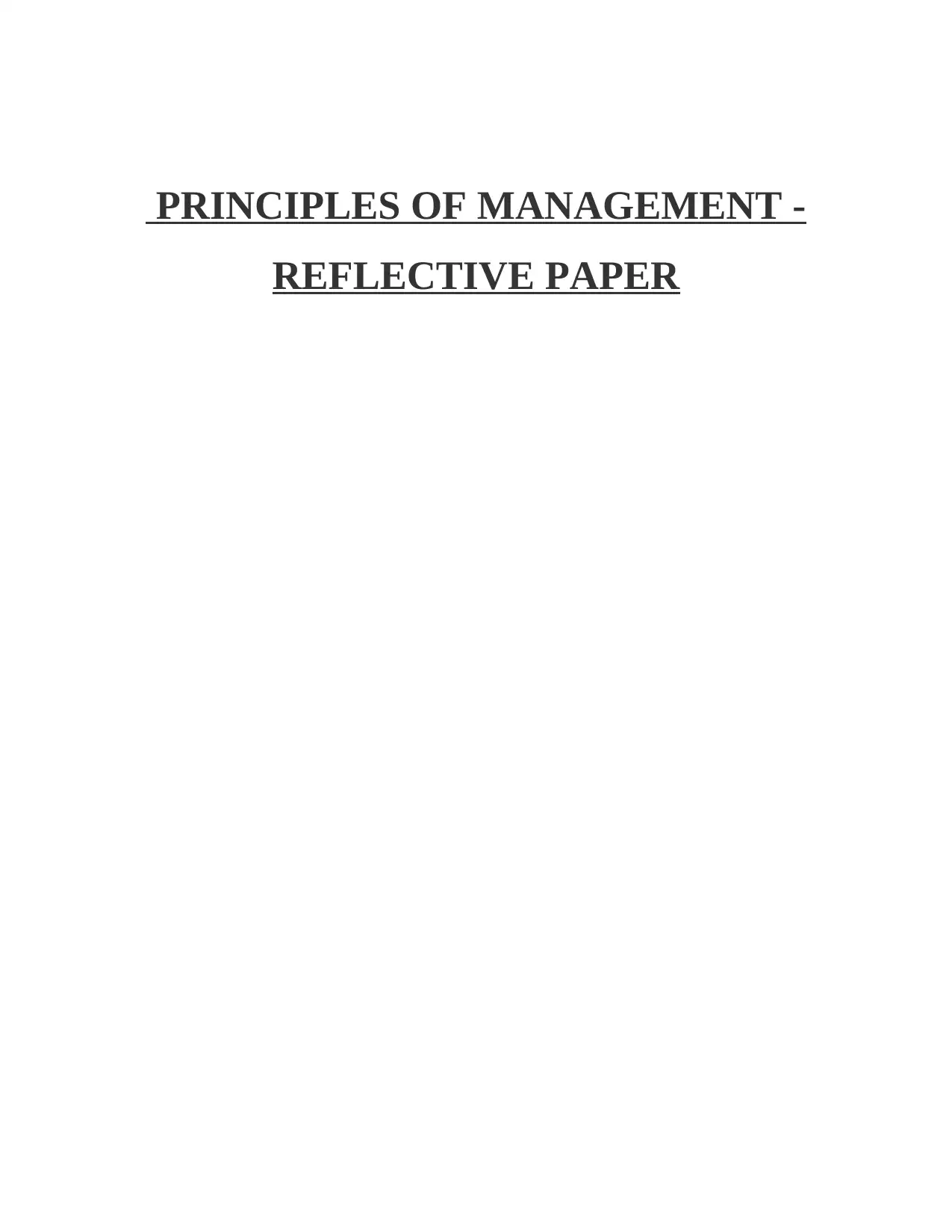
PRINCIPLES OF MANAGEMENT -
REFLECTIVE PAPER
REFLECTIVE PAPER
Paraphrase This Document
Need a fresh take? Get an instant paraphrase of this document with our AI Paraphraser
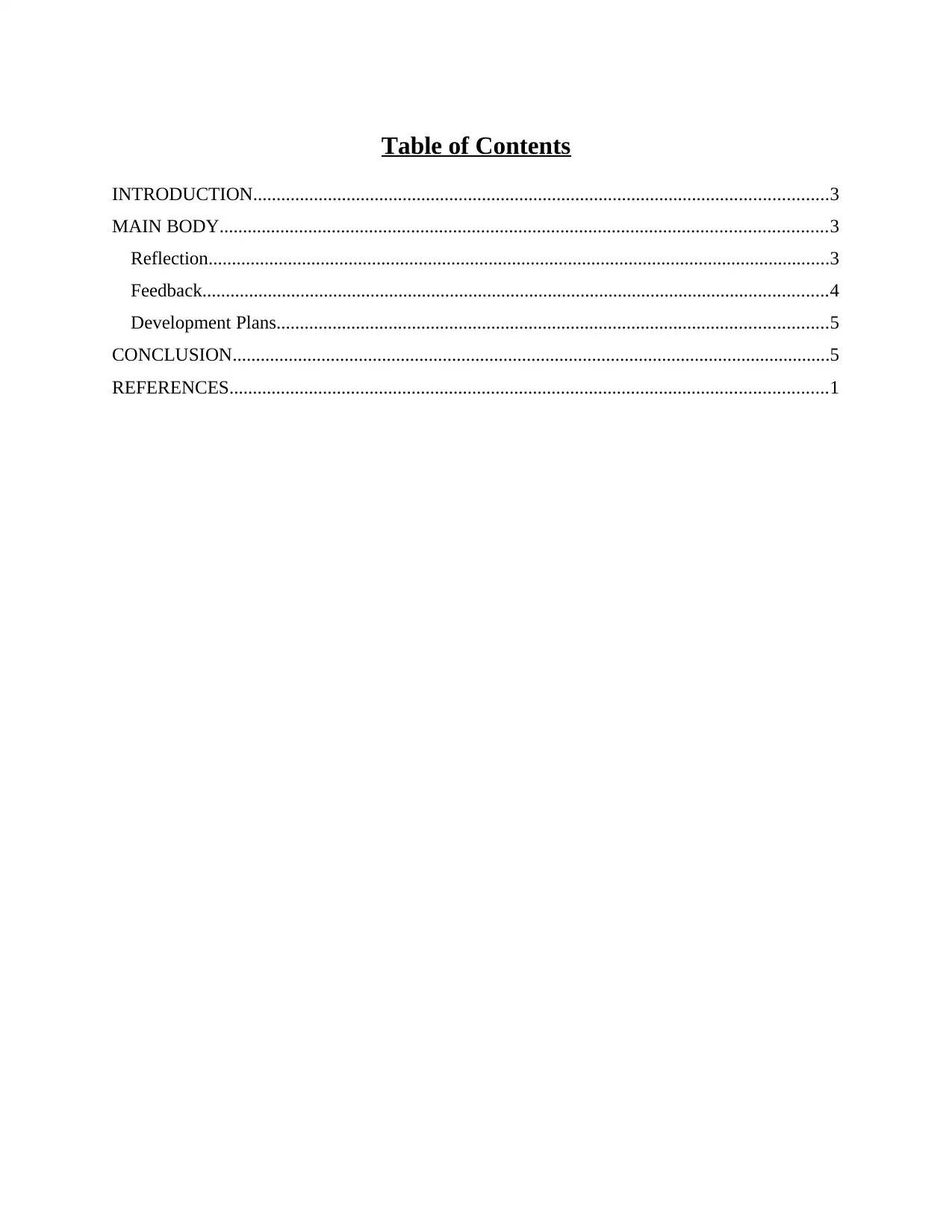
Table of Contents
INTRODUCTION...........................................................................................................................3
MAIN BODY..................................................................................................................................3
Reflection.....................................................................................................................................3
Feedback......................................................................................................................................4
Development Plans......................................................................................................................5
CONCLUSION................................................................................................................................5
REFERENCES................................................................................................................................1
INTRODUCTION...........................................................................................................................3
MAIN BODY..................................................................................................................................3
Reflection.....................................................................................................................................3
Feedback......................................................................................................................................4
Development Plans......................................................................................................................5
CONCLUSION................................................................................................................................5
REFERENCES................................................................................................................................1
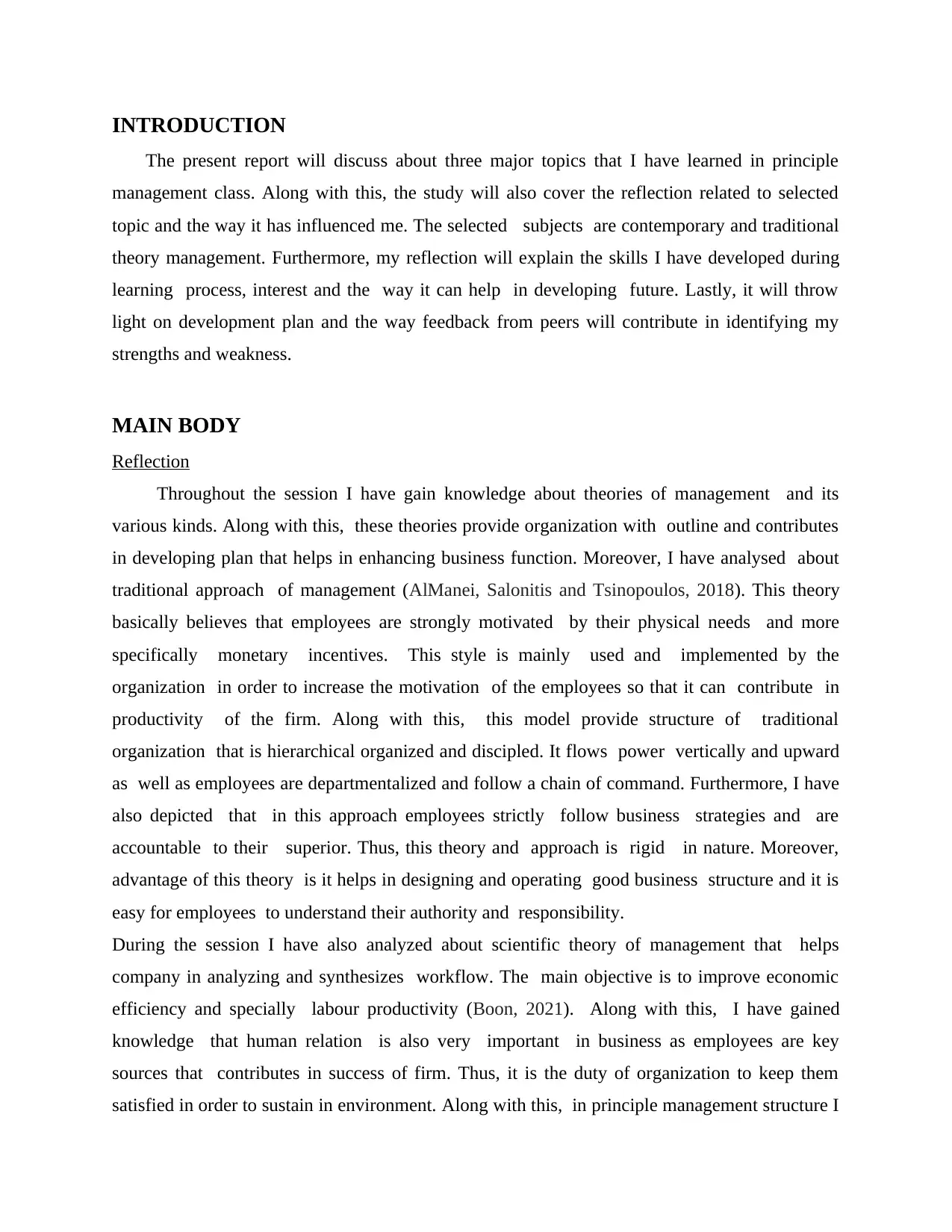
INTRODUCTION
The present report will discuss about three major topics that I have learned in principle
management class. Along with this, the study will also cover the reflection related to selected
topic and the way it has influenced me. The selected subjects are contemporary and traditional
theory management. Furthermore, my reflection will explain the skills I have developed during
learning process, interest and the way it can help in developing future. Lastly, it will throw
light on development plan and the way feedback from peers will contribute in identifying my
strengths and weakness.
MAIN BODY
Reflection
Throughout the session I have gain knowledge about theories of management and its
various kinds. Along with this, these theories provide organization with outline and contributes
in developing plan that helps in enhancing business function. Moreover, I have analysed about
traditional approach of management (AlManei, Salonitis and Tsinopoulos, 2018). This theory
basically believes that employees are strongly motivated by their physical needs and more
specifically monetary incentives. This style is mainly used and implemented by the
organization in order to increase the motivation of the employees so that it can contribute in
productivity of the firm. Along with this, this model provide structure of traditional
organization that is hierarchical organized and discipled. It flows power vertically and upward
as well as employees are departmentalized and follow a chain of command. Furthermore, I have
also depicted that in this approach employees strictly follow business strategies and are
accountable to their superior. Thus, this theory and approach is rigid in nature. Moreover,
advantage of this theory is it helps in designing and operating good business structure and it is
easy for employees to understand their authority and responsibility.
During the session I have also analyzed about scientific theory of management that helps
company in analyzing and synthesizes workflow. The main objective is to improve economic
efficiency and specially labour productivity (Boon, 2021). Along with this, I have gained
knowledge that human relation is also very important in business as employees are key
sources that contributes in success of firm. Thus, it is the duty of organization to keep them
satisfied in order to sustain in environment. Along with this, in principle management structure I
The present report will discuss about three major topics that I have learned in principle
management class. Along with this, the study will also cover the reflection related to selected
topic and the way it has influenced me. The selected subjects are contemporary and traditional
theory management. Furthermore, my reflection will explain the skills I have developed during
learning process, interest and the way it can help in developing future. Lastly, it will throw
light on development plan and the way feedback from peers will contribute in identifying my
strengths and weakness.
MAIN BODY
Reflection
Throughout the session I have gain knowledge about theories of management and its
various kinds. Along with this, these theories provide organization with outline and contributes
in developing plan that helps in enhancing business function. Moreover, I have analysed about
traditional approach of management (AlManei, Salonitis and Tsinopoulos, 2018). This theory
basically believes that employees are strongly motivated by their physical needs and more
specifically monetary incentives. This style is mainly used and implemented by the
organization in order to increase the motivation of the employees so that it can contribute in
productivity of the firm. Along with this, this model provide structure of traditional
organization that is hierarchical organized and discipled. It flows power vertically and upward
as well as employees are departmentalized and follow a chain of command. Furthermore, I have
also depicted that in this approach employees strictly follow business strategies and are
accountable to their superior. Thus, this theory and approach is rigid in nature. Moreover,
advantage of this theory is it helps in designing and operating good business structure and it is
easy for employees to understand their authority and responsibility.
During the session I have also analyzed about scientific theory of management that helps
company in analyzing and synthesizes workflow. The main objective is to improve economic
efficiency and specially labour productivity (Boon, 2021). Along with this, I have gained
knowledge that human relation is also very important in business as employees are key
sources that contributes in success of firm. Thus, it is the duty of organization to keep them
satisfied in order to sustain in environment. Along with this, in principle management structure I
⊘ This is a preview!⊘
Do you want full access?
Subscribe today to unlock all pages.

Trusted by 1+ million students worldwide
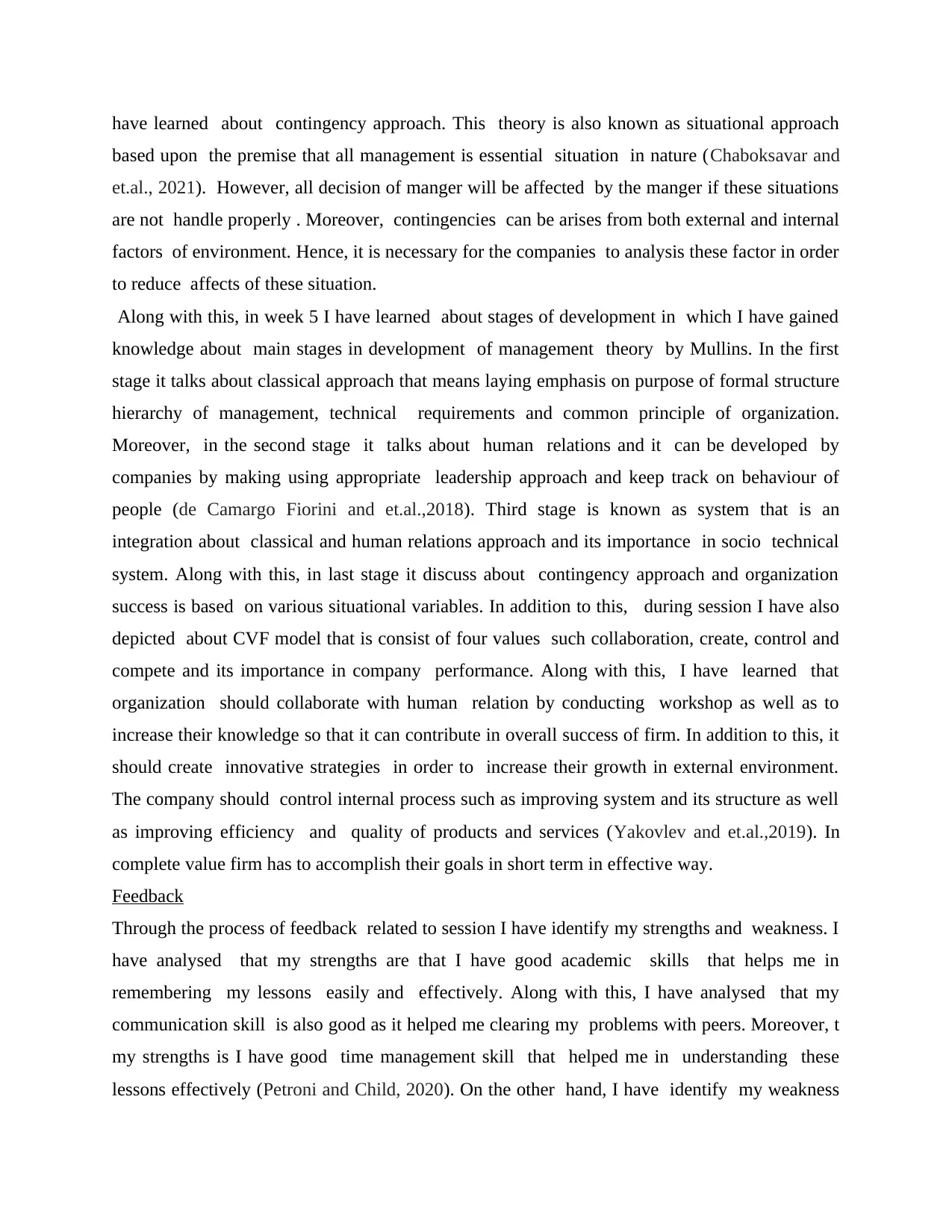
have learned about contingency approach. This theory is also known as situational approach
based upon the premise that all management is essential situation in nature (Chaboksavar and
et.al., 2021). However, all decision of manger will be affected by the manger if these situations
are not handle properly . Moreover, contingencies can be arises from both external and internal
factors of environment. Hence, it is necessary for the companies to analysis these factor in order
to reduce affects of these situation.
Along with this, in week 5 I have learned about stages of development in which I have gained
knowledge about main stages in development of management theory by Mullins. In the first
stage it talks about classical approach that means laying emphasis on purpose of formal structure
hierarchy of management, technical requirements and common principle of organization.
Moreover, in the second stage it talks about human relations and it can be developed by
companies by making using appropriate leadership approach and keep track on behaviour of
people (de Camargo Fiorini and et.al.,2018). Third stage is known as system that is an
integration about classical and human relations approach and its importance in socio technical
system. Along with this, in last stage it discuss about contingency approach and organization
success is based on various situational variables. In addition to this, during session I have also
depicted about CVF model that is consist of four values such collaboration, create, control and
compete and its importance in company performance. Along with this, I have learned that
organization should collaborate with human relation by conducting workshop as well as to
increase their knowledge so that it can contribute in overall success of firm. In addition to this, it
should create innovative strategies in order to increase their growth in external environment.
The company should control internal process such as improving system and its structure as well
as improving efficiency and quality of products and services (Yakovlev and et.al.,2019). In
complete value firm has to accomplish their goals in short term in effective way.
Feedback
Through the process of feedback related to session I have identify my strengths and weakness. I
have analysed that my strengths are that I have good academic skills that helps me in
remembering my lessons easily and effectively. Along with this, I have analysed that my
communication skill is also good as it helped me clearing my problems with peers. Moreover, t
my strengths is I have good time management skill that helped me in understanding these
lessons effectively (Petroni and Child, 2020). On the other hand, I have identify my weakness
based upon the premise that all management is essential situation in nature (Chaboksavar and
et.al., 2021). However, all decision of manger will be affected by the manger if these situations
are not handle properly . Moreover, contingencies can be arises from both external and internal
factors of environment. Hence, it is necessary for the companies to analysis these factor in order
to reduce affects of these situation.
Along with this, in week 5 I have learned about stages of development in which I have gained
knowledge about main stages in development of management theory by Mullins. In the first
stage it talks about classical approach that means laying emphasis on purpose of formal structure
hierarchy of management, technical requirements and common principle of organization.
Moreover, in the second stage it talks about human relations and it can be developed by
companies by making using appropriate leadership approach and keep track on behaviour of
people (de Camargo Fiorini and et.al.,2018). Third stage is known as system that is an
integration about classical and human relations approach and its importance in socio technical
system. Along with this, in last stage it discuss about contingency approach and organization
success is based on various situational variables. In addition to this, during session I have also
depicted about CVF model that is consist of four values such collaboration, create, control and
compete and its importance in company performance. Along with this, I have learned that
organization should collaborate with human relation by conducting workshop as well as to
increase their knowledge so that it can contribute in overall success of firm. In addition to this, it
should create innovative strategies in order to increase their growth in external environment.
The company should control internal process such as improving system and its structure as well
as improving efficiency and quality of products and services (Yakovlev and et.al.,2019). In
complete value firm has to accomplish their goals in short term in effective way.
Feedback
Through the process of feedback related to session I have identify my strengths and weakness. I
have analysed that my strengths are that I have good academic skills that helps me in
remembering my lessons easily and effectively. Along with this, I have analysed that my
communication skill is also good as it helped me clearing my problems with peers. Moreover, t
my strengths is I have good time management skill that helped me in understanding these
lessons effectively (Petroni and Child, 2020). On the other hand, I have identify my weakness
Paraphrase This Document
Need a fresh take? Get an instant paraphrase of this document with our AI Paraphraser
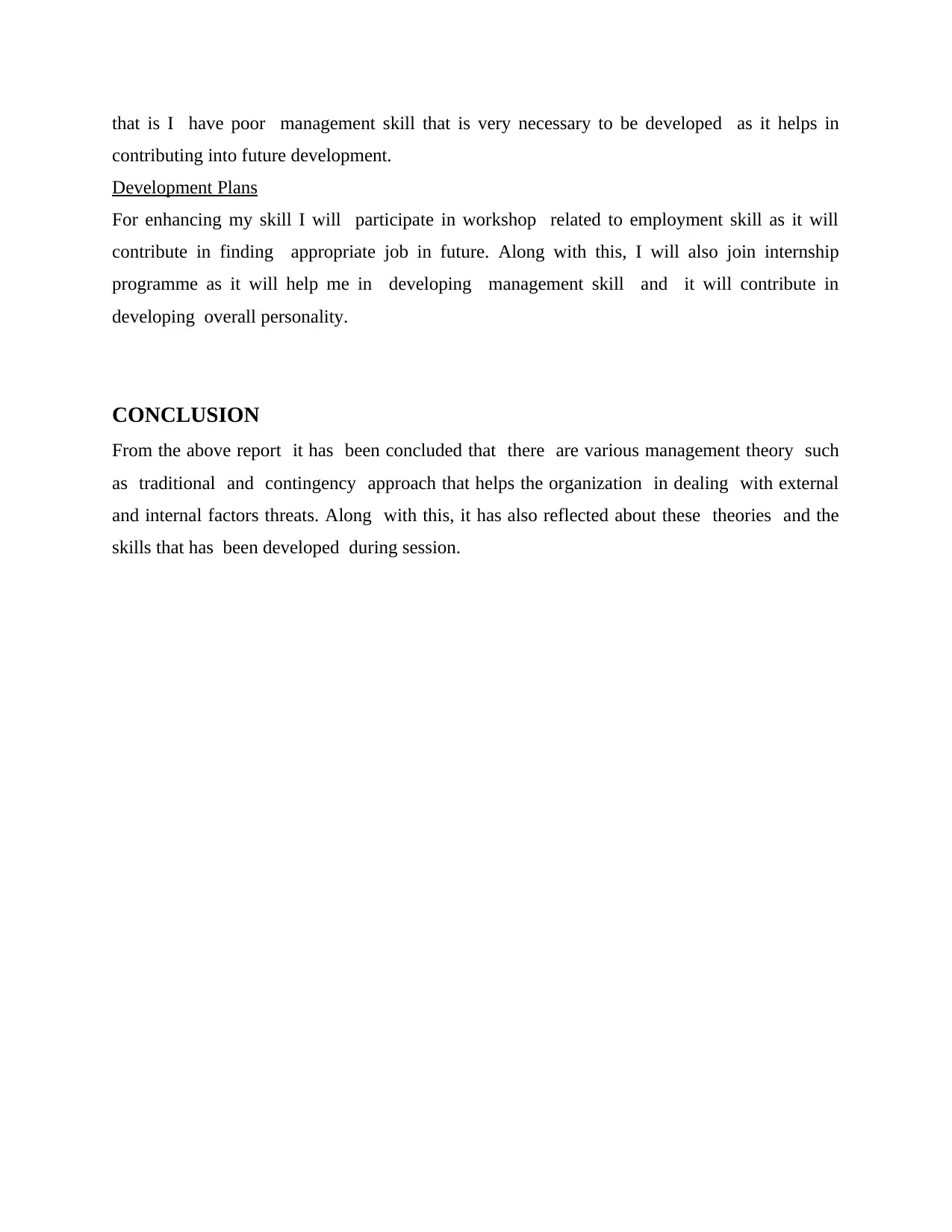
that is I have poor management skill that is very necessary to be developed as it helps in
contributing into future development.
Development Plans
For enhancing my skill I will participate in workshop related to employment skill as it will
contribute in finding appropriate job in future. Along with this, I will also join internship
programme as it will help me in developing management skill and it will contribute in
developing overall personality.
CONCLUSION
From the above report it has been concluded that there are various management theory such
as traditional and contingency approach that helps the organization in dealing with external
and internal factors threats. Along with this, it has also reflected about these theories and the
skills that has been developed during session.
contributing into future development.
Development Plans
For enhancing my skill I will participate in workshop related to employment skill as it will
contribute in finding appropriate job in future. Along with this, I will also join internship
programme as it will help me in developing management skill and it will contribute in
developing overall personality.
CONCLUSION
From the above report it has been concluded that there are various management theory such
as traditional and contingency approach that helps the organization in dealing with external
and internal factors threats. Along with this, it has also reflected about these theories and the
skills that has been developed during session.
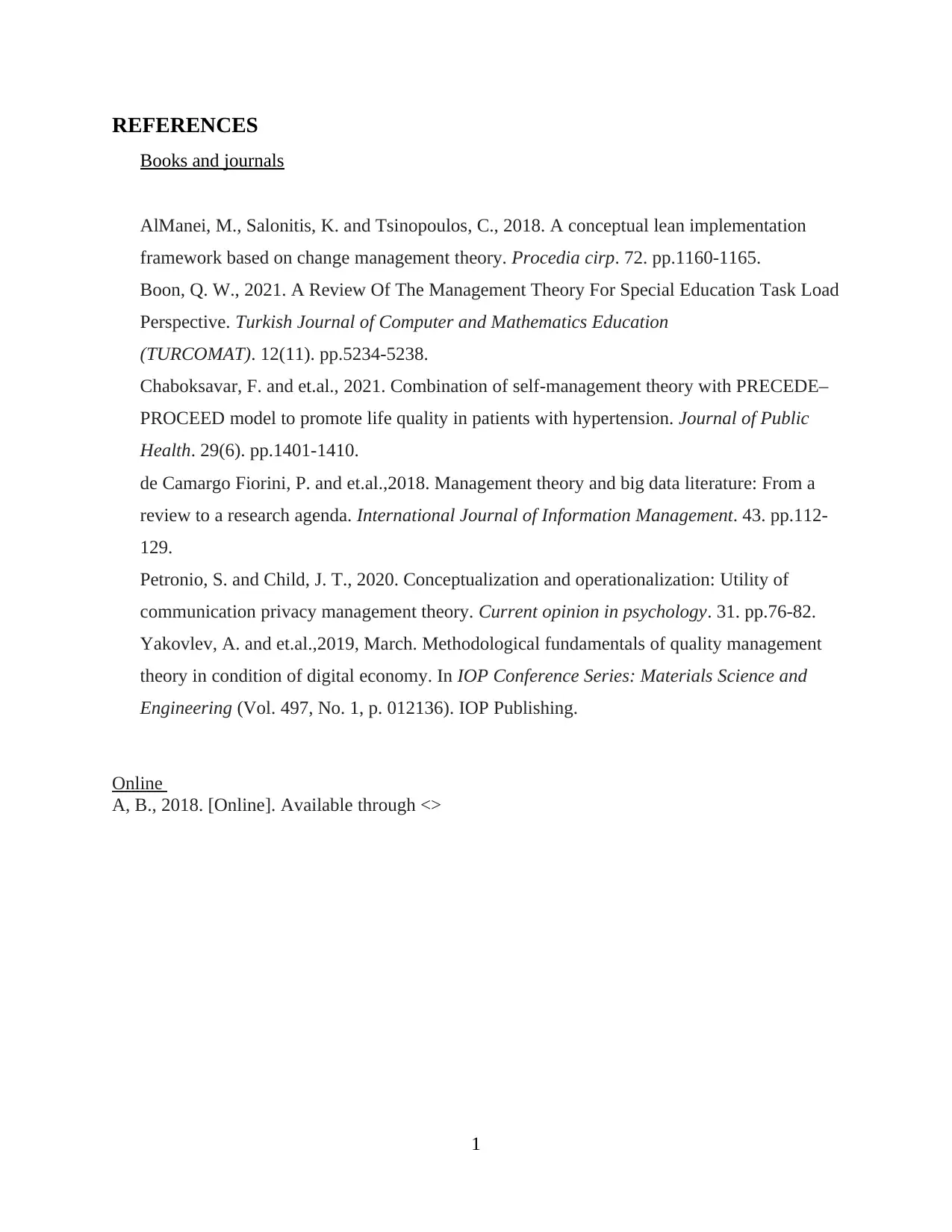
REFERENCES
Books and journals
AlManei, M., Salonitis, K. and Tsinopoulos, C., 2018. A conceptual lean implementation
framework based on change management theory. Procedia cirp. 72. pp.1160-1165.
Boon, Q. W., 2021. A Review Of The Management Theory For Special Education Task Load
Perspective. Turkish Journal of Computer and Mathematics Education
(TURCOMAT). 12(11). pp.5234-5238.
Chaboksavar, F. and et.al., 2021. Combination of self-management theory with PRECEDE–
PROCEED model to promote life quality in patients with hypertension. Journal of Public
Health. 29(6). pp.1401-1410.
de Camargo Fiorini, P. and et.al.,2018. Management theory and big data literature: From a
review to a research agenda. International Journal of Information Management. 43. pp.112-
129.
Petronio, S. and Child, J. T., 2020. Conceptualization and operationalization: Utility of
communication privacy management theory. Current opinion in psychology. 31. pp.76-82.
Yakovlev, A. and et.al.,2019, March. Methodological fundamentals of quality management
theory in condition of digital economy. In IOP Conference Series: Materials Science and
Engineering (Vol. 497, No. 1, p. 012136). IOP Publishing.
Online
A, B., 2018. [Online]. Available through <>
1
Books and journals
AlManei, M., Salonitis, K. and Tsinopoulos, C., 2018. A conceptual lean implementation
framework based on change management theory. Procedia cirp. 72. pp.1160-1165.
Boon, Q. W., 2021. A Review Of The Management Theory For Special Education Task Load
Perspective. Turkish Journal of Computer and Mathematics Education
(TURCOMAT). 12(11). pp.5234-5238.
Chaboksavar, F. and et.al., 2021. Combination of self-management theory with PRECEDE–
PROCEED model to promote life quality in patients with hypertension. Journal of Public
Health. 29(6). pp.1401-1410.
de Camargo Fiorini, P. and et.al.,2018. Management theory and big data literature: From a
review to a research agenda. International Journal of Information Management. 43. pp.112-
129.
Petronio, S. and Child, J. T., 2020. Conceptualization and operationalization: Utility of
communication privacy management theory. Current opinion in psychology. 31. pp.76-82.
Yakovlev, A. and et.al.,2019, March. Methodological fundamentals of quality management
theory in condition of digital economy. In IOP Conference Series: Materials Science and
Engineering (Vol. 497, No. 1, p. 012136). IOP Publishing.
Online
A, B., 2018. [Online]. Available through <>
1
⊘ This is a preview!⊘
Do you want full access?
Subscribe today to unlock all pages.

Trusted by 1+ million students worldwide

2
1 out of 7
Related Documents
Your All-in-One AI-Powered Toolkit for Academic Success.
+13062052269
info@desklib.com
Available 24*7 on WhatsApp / Email
![[object Object]](/_next/static/media/star-bottom.7253800d.svg)
Unlock your academic potential
Copyright © 2020–2026 A2Z Services. All Rights Reserved. Developed and managed by ZUCOL.



